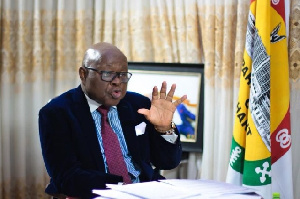- Home - News
- Polls
- Year In Review
- News Archive
- Crime & Punishment
- Politics
- Regional
- Editorial
- Health
- Ghanaians Abroad
- Tabloid
- Africa
- Religion
- Election 2020
- Coronavirus
- Photo Archives
- News Headlines
- Press Release
General News of Friday, 4 October 2019
Source: classfmonline.com
Leave us alone; we're not sabotaging you – Parliament to Amidu
Ghana’s Parliament has denied allegations by the Special Prosecutor, Martin Alamisi Amidu, that the chamber is frustrating his efforts to prosecute Mr Mahama Ayariga, the Member of Parliament for Bawku Central.
Parliament, in a statement, said: “Contrary to these allegations, Parliament would like to state that it is not seeking to sabotage the work of the Special Prosecutor nor any law enforcement agency.
“Indeed, our engagement with the Special Prosecutor was a follow-up to a letter dated the 23rd May 20I9, which he had written to the Speaker, whereby Mr Amidu requested the release of the Hon. Mahama Ayariga to be arraigned at the High Court in Accra on 4 June 2019.
“Parliament, on 31 May 2019, wrote to the Special Prosecutor recognising the role of the latter in the fight against corruption. Parliament invited the Special Prosecutor for further discussions on the matter.
“According to the letter, the meeting was to ‘dialogue with your high office as to how your Office and the Court could be availed of Hon. Ayariga for arraignment before Court with due regard to his privileges, the presumption of innocence and in a manner which will enable him to continue to efficiently perform his Parliamentary duties’”.
“At the said meeting, the Special Prosecutor's attention was drawn to Articles 117, I 18 (I) and 122 of the 1992 Constitution which provide that:
117: Civil or criminal coming from any court or place out of Parliament shall not be served on, or executed in relation to the Speaker or a member or the Clerk to Parliament while he is on his way to, attending at or returning from, any proceedings of parliament.
118 (1): Neither the Speaker nor a member of, nor the Clerk to Parliament shall be compelled while attending Parliament to appear as a witness in any court of place out of parliament.
112: an act or omission which obstructs or impedes parliament in the performance of its functions or which obstructs or impedes a member or officer of parliament in the discharge of his duties or affronts the dignity of Parliament or which tends either directly or indirectly to produce that result, is contempt of parliament”.
“It is clear from the outset that the Special Prosecutor knew the purpose of the meeting and he elected to come. Indeed, he was accompanied by an official from his outfit at an open meeting in the Speaker's Conference Room, with the Speaker, the Majority and Minority Leaders, the Ranking Member of the Constitutional, Legal and Parliamentary Affairs Committee, and the Clerk to Parliament.
“To suggest, therefore, that the Speaker had a private meeting to get him to approach the prosecution wrongfully is unfounded. During the meeting, the Speaker emphasised that MPs are not above the law.
“However, there was the need to respect their privileges as provided for in the 1992 Constitution. The Special Prosecutor, however, differed with this viewpoint and the meeting ended. A subsequent letter of appreciation was sent to the Special Prosecutor by the Speaker which communication made reference to his differing viewpoint on that matter.
“It is pertinent to recount that at the meeting, Parliament suggested to the Special Prosecutor that it was not in any way saying that an MP could not be prosecuted. But just as it happened in the trial of Hon. Dan Abodakpi, the MP could be tried on Mondays. In addition, it was suggested that the long three-month vacation was coming soon (August to October) and the MP could be tried day to day. Certainly, the Special Prosecutor did not see the benefit of the suggestion to use the vacation time in Parliament to do a trial. The time is almost gone and the Prosecutor has done nothing.
“Parliament wants to state categorically that it co-operated with the Special Prosecutor during the investigation stage of the case in question. Indeed, Parliament has in the past, collaborated with other law enforcement agencies in similar matters as the Commissioner of Police and Director of the Criminal Investigation Department will testify. As the lawmaking arm of government, Parliament will under no circumstance attempt to break the laws of Ghana.
“The Special Prosecutor should not draw Parliament into his own issues at all.”
Entertainment










